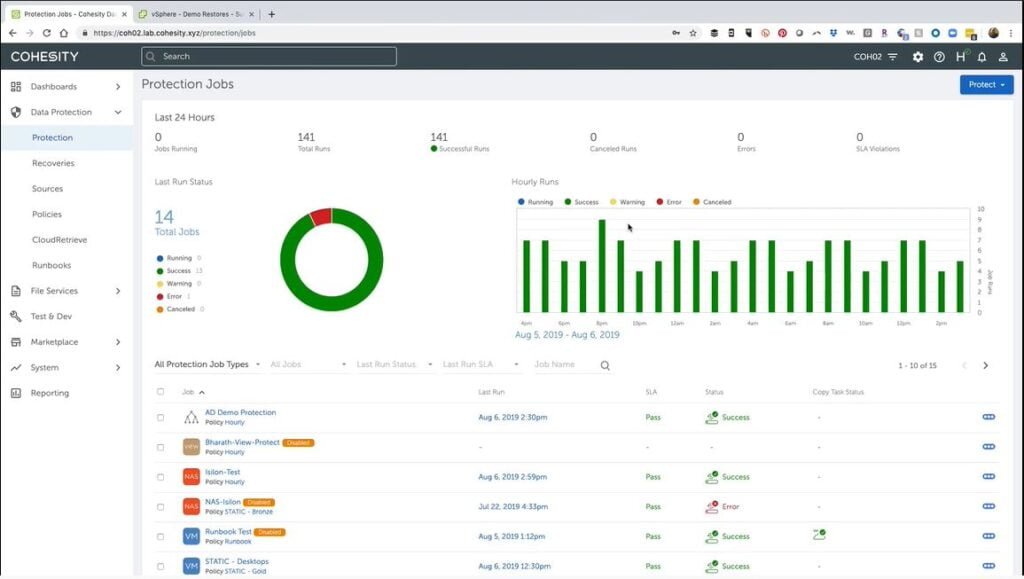
Kubernetes has revolutionized the way we manage and deploy applications, enabling unparalleled flexibility and scalability. However, with this power comes the need for robust backup solutions to ensure data protection, disaster recovery, and seamless restoration. In this comprehensive guide, we’ll delve into some of the top Kubernetes backup solutions available, including Kasten K10, Velero, Trilio Vault, Cohesity, and Stash by AppsCode.
Kasten K10: Kubernetes Data Management Platform

Kasten K10 is a comprehensive data management platform tailored for Kubernetes. It offers data protection, disaster recovery, and application mobility. K10 simplifies the backup and recovery process with its user-friendly interface and robust features. Key features include:
- Policy-Driven Backups: Create backup policies to automate data protection for your applications.
- Application-Centric: Backup, migrate, and clone entire applications with ease.
- Multi-Cloud Mobility: Seamlessly move your applications and data across clouds.
- Comprehensive Ecosystem Support: Kasten K10 supports various storage providers and Kubernetes distributions.
Velero: The Kubernetes Backup & Restore Tool
Velero, formerly known as Heptio Ark, is an open-source tool designed to back up and restore Kubernetes cluster resources and persistent volumes. Velero offers a straightforward backup solution with features like:
- Customizable Backup Policies: Tailor backup policies to meet your specific needs.
- Volume Snapshots: Create point-in-time snapshots of your persistent volumes.
- Multi-Cluster Support: Backup, migrate, and restore resources across different clusters.
- Plugin Architecture: Velero’s extensibility allows for integration with various cloud providers.
Trilio Vault: Cloud-Native Data Protection for Kubernetes
Trilio Vault focuses on data protection for cloud-native workloads, particularly in the Kubernetes environment. This solution offers robust backup and recovery capabilities, including:
- Application-Centric Protection: Protect entire applications, ensuring consistent states during recovery.
- Automated Workflows: Create automated backup schedules to streamline data protection.
- Incremental Backups: Save storage space and time with incremental backup capabilities.
- Application Cloning: Easily clone applications for development, testing, or disaster recovery purposes.
Cohesity: Modern Data Management for Kubernetes

Cohesity is known for its modern data management platform, which extends its services to Kubernetes. Key features of Cohesity’s Kubernetes backup solution include:
- Simplified Management: A unified platform to manage data across the enterprise.
- Data Protection and Recovery: Comprehensive backup, recovery, and replication features.
- Data Mobility: Seamlessly move data between on-premises and cloud environments.
- Security and Compliance: Ensure data is protected and compliant with industry standards.
Stash by AppsCode: Kubernetes Backup and Recovery Operator
Stash by AppsCode is a Kubernetes operator designed for data protection. With Stash, you can effortlessly create and manage backup and restore processes in your Kubernetes clusters. Notable features include:
- CRD-Based Backups: Define backup policies using Custom Resource Definitions (CRDs).
- Volume Snapshot Support: Utilize volume snapshots to capture the state of persistent volumes.
- Encryption and Compression: Secure your backups with encryption and reduce storage costs with compression.
- Hooks and Annotations: Customize backup and restore workflows with pre and post-processing hooks.
Choosing the Right Kubernetes Backup Solution
When selecting a Kubernetes backup solution for your organization, consider the following factors:
- Ease of Use: Look for a solution that is easy to install, configure, and manage, allowing your team to focus on other critical tasks.
- Compatibility and Integration: Ensure the backup solution integrates seamlessly with your existing Kubernetes environment, including storage systems and cloud providers.
- Performance and Scalability: Assess the solution’s performance and scalability to meet the growing demands of your Kubernetes infrastructure.
- Security and Compliance: Prioritize data security, encryption, and compliance with industry standards and regulations to protect sensitive information.
- Cost-effectiveness: Consider the total cost of ownership, including licensing, support, and infrastructure costs, to ensure the solution aligns with your budget.
Click here for Kubernetes backup best practices
Conclusion
Kubernetes backup solutions are crucial for safeguarding your cloud-native applications and data in this era of container orchestration. Whether you opt for Kasten K10, Velero, Trilio Vault, Cohesity, or Stash by AppsCode, each solution brings its unique set of features to the table. Your choice should depend on your specific needs and existing infrastructure.
To maintain the health and availability of your Kubernetes workloads, invest in a reliable backup solution that aligns with your organization’s goals and requirements. By doing so, you’ll be better prepared to navigate the complex world of cloud-native applications while keeping your data safe and sound.
[…] Check out the Kubernetes Backup Solutions: https://devopstipstricks.com/unlock-data-resilience-with-kubernetes-backup-solutions/ […]